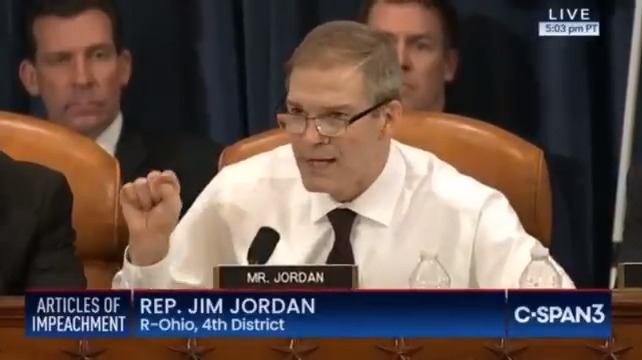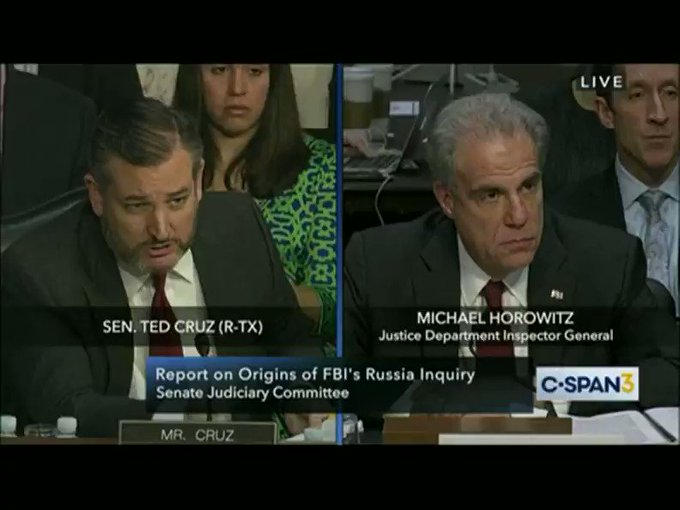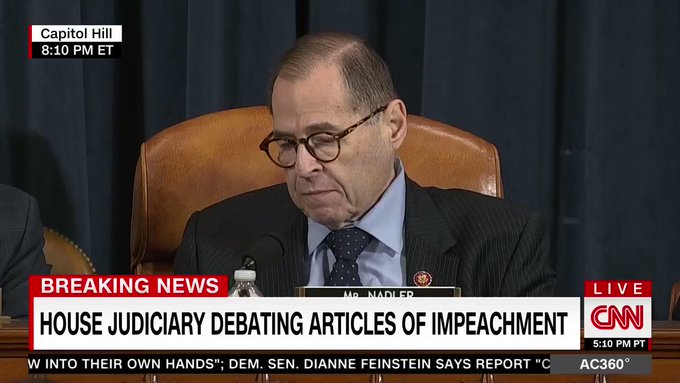Impeachment markup heats up as Dems invoke MLK, Nadler says 'we cannot rely on an election' to oust Trump
Chairman Nadler and Ranking Member Collins deliver their opening statements at impeachment markup meeting
Nadler insisted Democrats cannot wait until the election to remove Trump; Collins quickly fired back.
The House Judiciary Committee on Wednesday night began the first phase of a fiery "markup" process for the two articles of impeachment against President Trump that they have settled on, barreling toward a final floor vote even as moderate Democrats in GOP-leaning districts have floated the idea of backing down in favor of a censure resolution.
Almost immediately, the evening proceedings broke out into heated disagreement, as the panel's top Democrat declared that it would be unsafe to wait until the 2020 election to remove Trump, and another claimed Trump's actions were an "affront to the memory of the Rev. Martin Luther King Jr." Meanwhile, the ranking Republican slammed Democrats for attacking Ukraine's leader because he had undercut their case against Trump, which has foundered in several battleground polls.
"We cannot rely on an election to solve our problems, when the president threatens the very integrity of that election," House Judiciary Committee Chairman Jerry Nadler, D-N.Y., said in his opening statement, claiming Trump's discussions with Ukrainian President Volodymyr Zelensky about Joe and Hunter Biden's dealings in the country, and the White House's temporary withholding of military aid to Ukraine, constituted an "urgent" threat to national security.
"This committee now owes it to the American people to give these articles careful attention," Nadler added at the beginning of the markup for the impeachment articles, which included obstruction of Congress and abuse of power.
Nadler, who lamented that he had a "heavy heart" over the ordeal, said there were three key questions for Congress to evaluate: whether the evidence clearly showed that Trump committed the acts alleged in his dealings with Ukraine, whether the acts rose to the impeachment standard of "high crimes and misdemeanors," and what the consequences for national security were if Congress failed to act.
The top Republican on the panel, Rep. Doug Collins of Georgia, shot back that Democrats have been trying to impeach Trump since he took office. He echoed the White House's argument that the impeachment was politically motivated theater, long in the works and foreshadowed openly by Democrats for months, if not years.
Collins noted that Zelensky has repeatedly denied Trump ever pressured him, and that Democrats then turned on Zelensky to call him a "liar." Collins went on to slam the Democrats on the Judiciary Committee for hosting a hearing with three anti-Trump law professors with no personal knowledge of any relevant conduct by the president; Republicans invited one professor.
Former President Barack Obama, Republicans have said, also withheld lethal military aid to Ukraine, amid concerns about the country's documented corruption and the potential risks of escalating conflict with Russia. And, the Trump administration also withheld aid to other countries this year, including $100M to Lebanon.
As the members debated, the White House Office of Management and Budget released a lengthy legal justification for the withholding of aid to Ukraine, which was obtained by Fox News. OMB classified the temporary pause in providing the aid to Ukraine as a "programmatic delay" that was necessary and proper under the law to "ensure that funds were not obligated prematurely in a manner that could conflict with the President's foreign policy."
Collins and Wisconsin GOP Rep. Jim Sensenbrenner each observed that unlike previous presidents who have faced impeachment, Trump was not accused of any offense actually defined anywhere by law: neither "abuse of power" nor "obstruction of Congress" is a recognized federal or state crime. (The separate charge of contempt of Congress, according to the DOJ's Office of Legal Counsel, exempts the president for separation-of-powers reasons.)
The late-night markup session marked something of a doubleheader for Congress, after Justice Department Inspector General Michael E. Horowitz's testimony dominated most of the day. The night consisted almost entirely of opening statements. The markup of the impeachment articles will resume in earnest at 9 a.m. ET on Thursday; during markup sessions, representatives typically fine-tune legislation or other resolutions, offering amendments, debating, and settling on final language.
Texas GOP Rep. Louie Gohmert, in his opening statement at the markup, noted that Horowitz had confirmed that the FBI violated its own procedures in 2016 and 2017 by relying extensively on an unreliable and since-discredited dossier funded by the Hillary Clinton campaign and Democratic National Committee to secure a surveillance warrant to monitor former Trump aide Carter Page. In at least one case, Horowitz said, an FBI lawyer falsified a document to get the warrant, potentially committing a crime in the process.
Prior to the FBI's warrant application to monitor Page, the FBI reached out to the CIA and other intelligence agencies for information on Page, Horowitz discovered. The CIA responded in an email by telling the FBI that Page had contacts with Russians from 2008 to 2013, but that Page had reported them to the CIA and was serving as a CIA operational contact and informant on Russian business and intelligence interests.
An FBI lawyer then doctored the CIA's email about Page to make it seem as though the agency had said only that Page was not an active source. And, the FBI included Page's contacts with Russians in the warrant application as evidence he was a foreign "agent," without disclosing in any way to the secret surveillance court that Page was voluntarily working with the CIA concerning those foreign contacts.
For several years, Democrats and left-wing analysts at The New York Times, The Washington Post, and CNN have repeatedly and falsely claimed that key claims in the Clinton-funded anti-Trump dossier had been corroborated and that the document was not critical to the FBI's warrant to surveil Page. Horowitz repudiated that claim, with the FBI's legal counsel even describing the warrant to surveil Page as "essentially a single source FISA" wholly dependent on the dossier.
Among the false or unsubstantiated claims in the dossier: That ex-Trump lawyer Michael Cohen traveled to Prague to conspire with Russian hackers; that the Trump campaign was paying hackers working out of a nonexistent Russian consulate in Miami; that a lurid blackmail tape of Trump existed and might be in Russian possession; and that Page was bribed with a 19 percent share in a Russian company. (Earlier this week, CNN erroneously claimed that "many" of the dossier's claims were accurate.)
No crimes had been committed by Trump, Gohmert argued at the markup, despite years of accusations by Democrats that he was a Russian spy and costly investigations into his campaign -- suggesting, Gohmert said, that Democrats' current accusations also lacked merit.
Gohmert eventually attempted to raise a point of order, to question Nadler what "crimes" Democrats were repeatedly referencing during the hearing, given that none were established in the draft of the impeachment articles provided to the Republicans ahead of the hearing. Nadler gaveled down Gohmert, saying his query was not a valid point of order.
Ohio GOP Rep. Jim Jordan hammered Gohmert's point, highlighting Horowitz's conclusions that the FBI's Hillary Clinton and Trump probes were run by agents who were overtly opposed to the president, and who even discussed how to avoid angering Clinton while pursuing Trump aggressively because that probe "matters."
Later, Democratic Tennessee Rep. Steve Cohen claimed that Trump's call with Zelensky was "an affront to the memory of the Rev. Martin Luther King Jr."
Separately, Rep. Hank Johnson, D-Ga., said the House's job wasn't to determine whether to remove the president, noting that the Senate would need to decide that question, with a two-thirds vote required for removal. Johnson claimed the president had tried to undermine democracy by taking out Biden ahead of the 2020 election.
And, Louisiana Democratic Rep. Cedric Richmond falsely claimed that White House chief of staff Mick Mulvaney had "confessed" openly to an illicit quid pro quo with Ukraine, when Mulvaney acknowledged only that aid was typically suspended to countries involved in corruption unless they agree to anticorruption efforts -- a statement later affirmed in the impeachment hearings by career State Department official George Kent.
Wednesday night's session lasted until 10:40 p.m. ET, as each member of the 41-member panel was entitled to 5 minutes of speaking time.
But, the committee likely will do most of the heavy lifting on Thursday, and vote the articles out of committee – sending them to the House floor for consideration. Then, it would be up to the House to schedule the articles for the House floor, likely the middle of next week.
Thursday's session is expected to last deep into the afternoon.

Speaker of the House Nancy Pelosi, D-Calif., has called for impeachment, after months of hedging. (AP Photo/J. Scott Applewhite)
The rapid pace has come as numerous polls showed declining support for impeachment in key swing states. For example, impeachment and removal was opposed by 50.8 percent of voters in Michigan, 52.2 percent of voters in Pennsylvania, and 57.9 percent of voters in Wisconsin, according to the Firehouse/Optimus December Battleground State Poll.
Two other polls released Wednesday confirmed that most Americans did not want Trump impeached and removed.
Politico reported earlier this week that the numbers were making a "small group" of moderate Democrats, who have held seats in districts where Trump won in 2016, nervous about how to vote. They instead have suggested Trump be censured instead, which would prevent the GOP from holding a potentially damaging Senate trial and give them political cover in the upcoming election.
But, hardline Democrats in safe districts haven't budged. California Rep. Karen Bass, for example, said Wednesday that she's open to impeaching Trump again even if he wins the 2020 election.
The House is now comprised of 431 members, meaning Democrats would need 217 yeas to impeach Trump. There are currently 233 Democrats, so Democrats could lose only 16 of their own and still impeach the president. Among the House Democrats, 31 represent more moderate districts that Trump carried in 2016.
"This is the other side of it being political -- you’ve got about 30 House Democrats who are in districts won by Donald Trump and they realize that they are going to pay a political price if they go along with impeachment," Fox News contributor Charles Hurt, the opinion editor of The Washington Times, told "Fox & Friends" Wednesday.
Freshman Rep. Elissa Slotkin, D-Mich. -- who flipped a GOP district in 2018 that Trump won by 7 points in 2016 -- told Fox News last month that she was tentatively weighing all the evidence. On Wednesday, she confirmed that she's still undecided.
"The phones are ringing off the hook," she told CNN. "We literally can't pick up the phones fast enough -- and it's people on both sides of it."
Fox News' Chad Pergram and Mike Emanuel contributed to this report.








 Ted Cruz summarizes it perfectly: “A lawyer at the FBI creates fraudulent evidence, alters an email that is in turn used as the basis for a sworn statement for the court that the court relies on. Am I stating that accurately?"
Ted Cruz summarizes it perfectly: “A lawyer at the FBI creates fraudulent evidence, alters an email that is in turn used as the basis for a sworn statement for the court that the court relies on. Am I stating that accurately?"








No comments:
Post a Comment